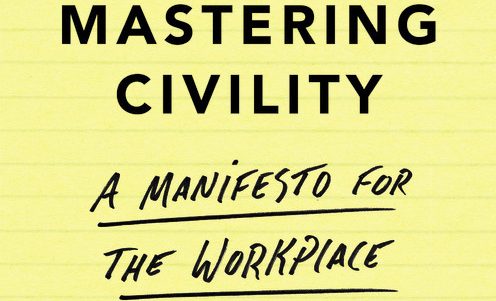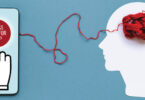What do leaders and organizations lose—both morally and in market share—when they allow rudeness to run rampant?
Reviewed by Allan Fallow
Mastering Civility arrives at a particularly coarse moment in American political and business culture, with the 2016 presidential campaign having pushed vituperation and vitriol to new heights—new depths?—and accusations of sexual harassment and assault toppling several pillars of the entertainment and media worlds. Indeed, when author Christine Porath—a management professor at Georgetown University’s McDonough School of Business—conducted her 2016 Civility in America survey, 95 percent of respondents told her they believe “we have a civility problem in America.” And 70 percent believe it has reached “crisis proportions.”
But why should this matter to anyone other than preschool teachers, hotel concierges and career diplomats? Isn’t the brash, hard-nosed businessperson a revered national trope? Not if you want your enterprise to flourish, Porath’s research reveals. In addition to the moral imperative of simply treating people better, money still talks for most organizations, says Porath. That’s why her lifetime crusade is “to show that incivility hits bottom lines hard.” According to the American Psychological Association, workplace stress saps the U.S. economy of $500 billion per year. Meanwhile, OSHA reports that workers under constant duress on the job cost insurers and health care providers 46 percent more than their less-stressed colleagues.
Porath devotes much of her book to gauging the scope of the civility epidemic, yet Mastering Civility is no mere policy primer. She decided to subtitle the work “a manifesto,” she explains, after two decades’ work in the field persuaded her that incivility is metastasizing by the day: “All of us desperately need to change this reality, for the sake of people and organizations.”
Boorish Bosses
Indeed, whereas Porath’s credential-heavy résumé might tempt you to assume she dwells in an ivory tower, she too has had her share of workplace run-ins with boorish bosses. Some—like the holiday-party encounter where “a powerful professor” loudly accused her of having published a book with a “f***ing stupid title”—left her shaking with doubt and mortification. Others woke her to the reality of just how systemically enfeebling and counterproductive rudeness can be. Early in Porath’s career, for example, she landed her “dream job”—helping a global brand set up a sports academy—only to discover that crassness and bullying were the order of the day:
The actions of a narcissistic, dictatorial boss trickled down through the ranks. Employees felt disconnected and disengaged. Some intentionally sabotaged the organization. … Many took out their frustrations on others, barking orders at colleagues [and] making snide remarks to customers. … Many talented people left, with some joining competing businesses. I was one of them.
Civility Fundamentals
So what can managers do to guarantee they are treating others in a civil manner? Those subjects are tackled in Parts 2 and 3 of Mastering Civility, where Porath makes the case that how well we treat others translates directly into how influential and effective we are.
First she invites us to take a “civility quiz” she designed. But Porath isn’t trying to cast you as the “jerk in the office,” she maintains; she simply wants to illustrate her conviction that “incivility usually arises not from malice but from ignorance.” So be prepared that her 32-question assessment (titled “Do you ever do any of these?”) may reveal that, yes, you do have a tendency to rely on email when a face-to-face chat would have been the more humane way to deliver the information in question, or that, no, you’re not truly listening to colleagues if you’re in the habit of checking email during meetings.
It’s a start—a way to determine if something about your body language or tone of voice could stand some tweaking. But quiz results alone cannot help you master the two behavioral traits—warmth and competence—that account for more than 90 percent of the positive or negative opinions we form of those around us. And those two behaviors are fundamental to success, says Porath: When “people see you as warm and competent, they’re more inclined to trust you, build relationships with you, follow you, and support you.”
Some of the “seven simple strategies” she offers for homing in on any blind spots in your comportment make sense: Work with a coach, solicit 360-degree feedback and teach yourself how to read others’ emotions. Others sound impractical: Who among us has the time to collect “positive examples of [our] best behavior” (or “most respectful self”) from 10 coworkers, friends or family members? Who among us is part of a work team that could withstand having “an open discussion about how and when you and your teammates are less than civil to each other?”
That said, it strikes me that Porath’s Strategy #7—“Take Care of Yourself”—should be required reading for anyone in sales who has ever seen their performance suffer by stinting on exercise, sleep, nutrition or meditation. And call it what you will (“reset,” “refocus,” “reflection”), some sort of mindfulness practice is a documented safety valve for staying calm when you’re flustered: One hour of yoga a week, the Duke University School of Medicine discovered, decreased the stress levels of Aetna employees by one-third. It also cut their healthcare costs by $2,000 per year, on average.
Oddly for a book that delves so deeply into personal interactions, Porath’s final part, “Handling Incivility If You’re the Target,” merits a mere 13-pages. Yet it’s here that anyone who’s been on the receiving end of an episode of professional disrespect should start reading. Porath counsels us to cultivate a sense of thriving, for it can serve as both buffer and balm to the toxic effects of incivility: “It may not be realistic for you to ‘toughen up,’ ” she writes, “but you can choose not to worry about what was said or done to you. … Don’t let someone make you a smaller version of yourself.”
Wise words from a civil tongue.
You Might Also Like…
by Tony Robbins
[Simon & Schuster]
256 pages
$15.60/hardcover
Best-selling author Tony Robbins offers a step-by-step resource of how to transform your financial future.
by Derek Thompson
[Penguin Press]
352 pages
$14.64/hardcover
A groundbreaking investigation into pop culture and why we like what we like.
by Brené Brown
[Random House Trade Paperbacks]
352 pages
$15.23/hardcover
This New York Times Bestseller looks at the defining stories of people who chose to get back up after a fall.
by Brad Stone
[Little, Brown and Company]
384 pages
$15.59/hardcover
A look at the new generation of Silicon Valley and how it’s using technology to disrupt entire industries and change the way we live.








